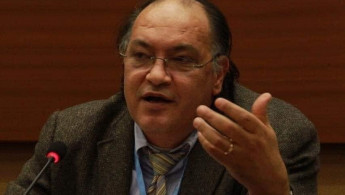Veteran Egyptian human rights activist dies of Covid-19
Hafez Abu Seada, a co-founder of the Egyptian Organisation for Human Rights who was arrested several times by the regime of former President Hosni Mubarak, died of Covid-19
2 min read
Hafez Abu Seada was accused of backing authoritarian President Sisi in recent years [Getty]
A leading Egyptian human rights activist died this week after contracting Covid-19, his wife said.
Hafez Abu Seada, a co-founder of the Egyptian Organisation for Human Rights, was diagnosed with the novel coronavirus earlier this month.
He passed away in a Cairo hospital at the age of 55, his wife Nehad Abo El Komsan said on Thursday, describing the rights advocate as "the love of my life, the father of my children, and the greatest man I've seen and lived with, and my pillar throughout my life".
Egypt has reported more than 114,000 Covid-19 cases and 6,596 deaths.
The Egyptian Organisation for Human Rights is one of the country's oldest human rights organisations.
Founded in 1985 by Abu Seada and late journalist Hani Shukrallah, the EOHR led campaigns against torture, abysmal prison conditions and draconian emergency laws.
Abu Seada was detained a number of times over his critical stance against the regime of ousted President Hosni Mubarak.
In later years the rights advocate faced accusations of being an apologist for current President Abdel Fattah al-Sisi.
Sisi, a former general, seized power from Mohammed Morsi, Egypt's first democratically elected president, in a 2013 military coup.
His government has since led a brutal crackdown on dissent, jailing tens of thousands including protesters, lawyers, journalists, academics and secular and Islamist activists.
Read more: Bracing for the Biden era, Egypt's Sisi intensifies brazen crackdown on human rights
Abu Seada's death comes as human rights organisations across the globe demand the release of leading rights activists arrested by Egyptian authorities earlier this month.
Three senior staff members of the Egyptian Initiative for Personal Rights (EIPR) were "arbitrarily" arrested days after meeting with Western ambassadors and other diplomats who visited their Cairo office, Amnesty International said last week.
Their arrests have been condemned by the United States, the United Nations and several European nations.
Cairo accuses the rights workers of "joining a terror group" and "spreading false news".
Hafez Abu Seada, a co-founder of the Egyptian Organisation for Human Rights, was diagnosed with the novel coronavirus earlier this month.
He passed away in a Cairo hospital at the age of 55, his wife Nehad Abo El Komsan said on Thursday, describing the rights advocate as "the love of my life, the father of my children, and the greatest man I've seen and lived with, and my pillar throughout my life".
Egypt has reported more than 114,000 Covid-19 cases and 6,596 deaths.
The Egyptian Organisation for Human Rights is one of the country's oldest human rights organisations.
Founded in 1985 by Abu Seada and late journalist Hani Shukrallah, the EOHR led campaigns against torture, abysmal prison conditions and draconian emergency laws.
Abu Seada was detained a number of times over his critical stance against the regime of ousted President Hosni Mubarak.
In later years the rights advocate faced accusations of being an apologist for current President Abdel Fattah al-Sisi.
Sisi, a former general, seized power from Mohammed Morsi, Egypt's first democratically elected president, in a 2013 military coup.
His government has since led a brutal crackdown on dissent, jailing tens of thousands including protesters, lawyers, journalists, academics and secular and Islamist activists.
Read more: Bracing for the Biden era, Egypt's Sisi intensifies brazen crackdown on human rights
Abu Seada's death comes as human rights organisations across the globe demand the release of leading rights activists arrested by Egyptian authorities earlier this month.
Three senior staff members of the Egyptian Initiative for Personal Rights (EIPR) were "arbitrarily" arrested days after meeting with Western ambassadors and other diplomats who visited their Cairo office, Amnesty International said last week.
Their arrests have been condemned by the United States, the United Nations and several European nations.
Cairo accuses the rights workers of "joining a terror group" and "spreading false news".
The trio have been placed in pre-trial detention for 15 days - which under Egyptian law can be extended up to two years.





 Follow the Middle East's top stories in English at The New Arab on Google News
Follow the Middle East's top stories in English at The New Arab on Google News


